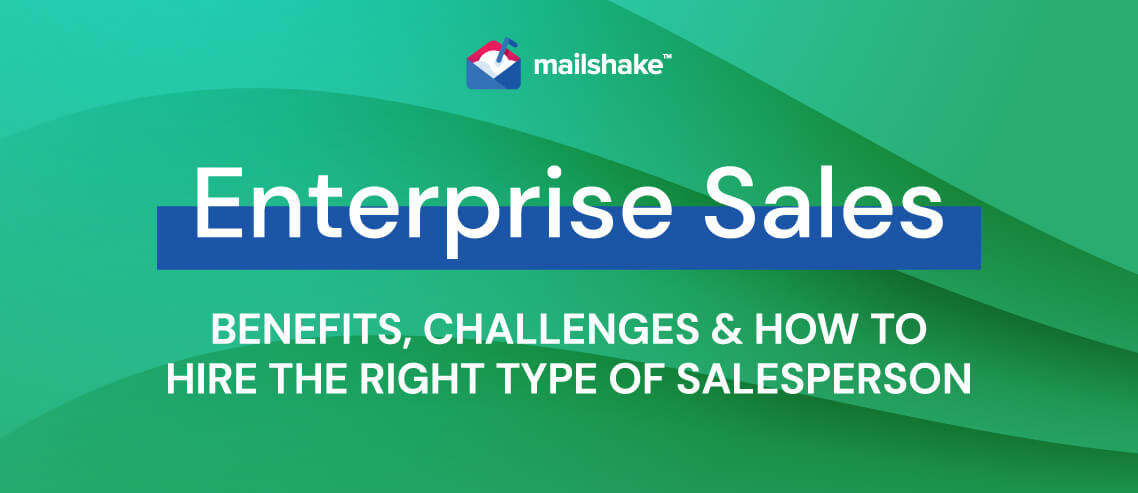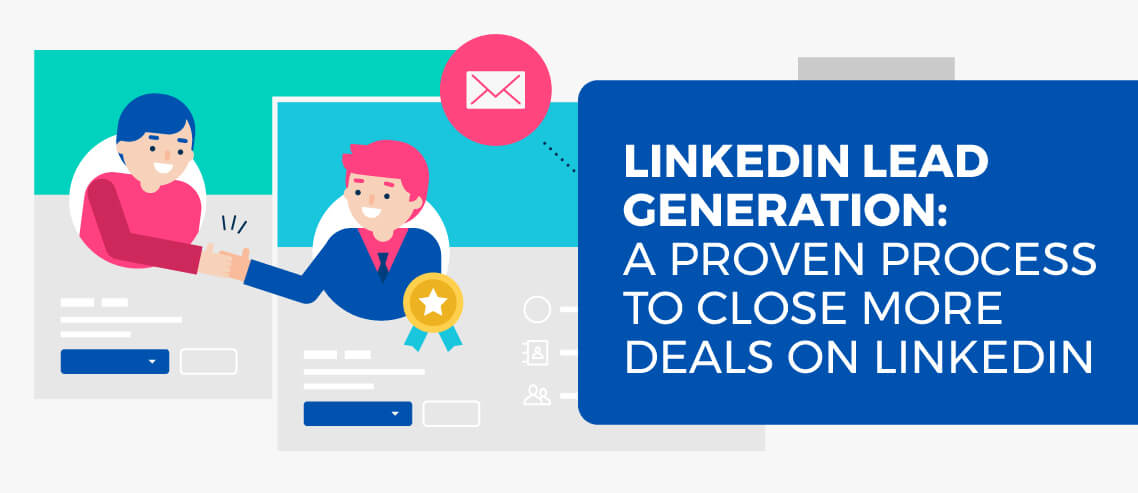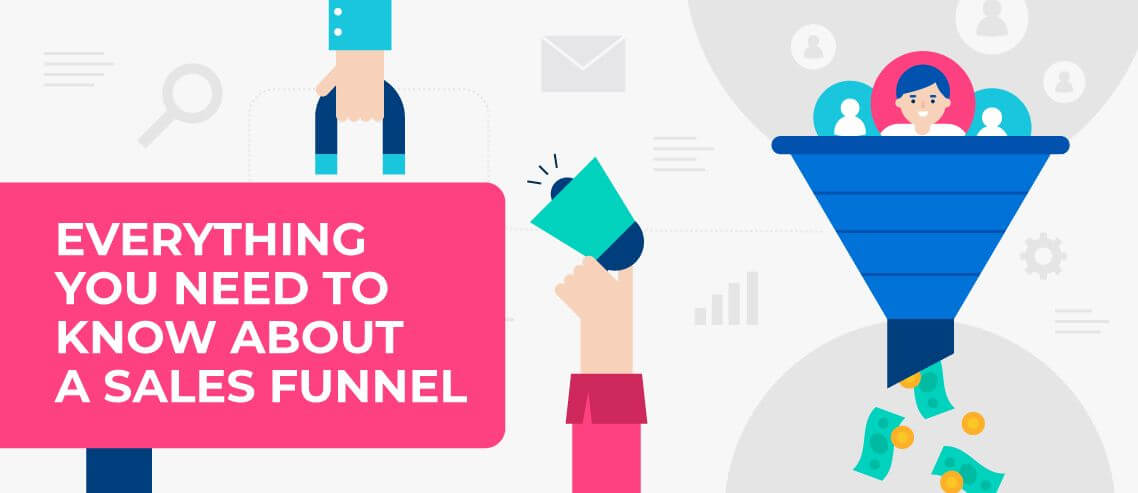Enterprise Sales: Benefits, Challenges & How to Hire the Right Type of Salesperson

Contents
The world of sales is vast, with various strategies and requirements. Enterprise sales is something that should be on every B2B company’s mind. It provides unique opportunities, but also immense challenges. In this article, we’ll explore what enterprise sales is and how to build a sales team to execute on it.
What is Enterprise Sales?
Enterprise sales is a unique concept in the world of B2B. As opposed to selling to startups or sole business owners, enterprise refers to large corporate solutions. It differs from other types of sales due to the sales cycle, decision makers, and risks involved.
The key ways that enterprise sales is different include:
- Higher Risk – Enterprise sales represent a lot more risk to the organization in terms of revenue.
- Longer Sales Cycle – It could take six months or longer to close the deal
- Many Decision Makers – There are often six to 10 decision makers, as opposed to one or two.
Complex Sales vs. Transactional Sales
Complex (enterprise) sales and transactional sales are very different. Transactional sales are those that most people recognize because they see it every day. They involve straightforward, fast decisions.
Examples would be buying a television from Best Buy, or a SMB buying a new table for their conference room. These transactional sales represent relatively low risk. And the sales cycle is relatively fast.
For this reason, many startups focus on selling transactional products early on. They can be sold in 30 to 60 days without a complicated buying process. On the other hand, enterprise sales requires several months of intense communication between the prospect and the sales rep.
To put the two in better contrast, here are the key aspects of transactional sales:
- Lower Risk – Transactional purchases typically come at a lower price point. This greatly reduces the risk to the prospect if they make the wrong decision.
- Shorter Sales Cycle – In a few weeks in some cases, transactional sales can be closed. This allows for more deal volume and more frequent payouts.
- Fewer Decision Makers – Every time another stakeholder gets involved, it complicates the process. Transactional sales are designed to be sold to one or two decision makers.
Why is Enterprise Sales Important for Your Business?
If your company offers a B2B solution, then enterprise sales should be a goal at some point in the future. There is nothing wrong with building your business and reputation from transactional sales to SMBs. However, eventually you should consider enterprise sales for the following reasons:
- More Revenue – Enterprise sales are where “whales” are — big clients who can purchase much more of your product. The larger the company, the more revenue growth they represent. That’s true of the initial purchase, as well as the recurring revenue.
- It Just Takes A Different Mindset – There’s not necessarily more intelligence or skill required to sell a $100,000 solution versus a $10,000 solution. The difference is ensuring you have the right management and leaders on your team.
- Generate Awareness – With enterprise sales, you are dealing with companies who are often global leaders in their space. The attention and reputation that these clients provide can be worth even more than the short term revenue.
- Scalability – In order to truly grow your company, you must scale with more clients. At a certain point, you may discover that the list of potential SMB prospects has run out. That’s why you need enterprise clients in the pipeline.
What are the Challenges of Enterprise Sales?
It’s important for companies to consider transitioning to enterprise models. It provides numerous benefits for our growth. However, enterprise sales doesn’t come without its fair share of challenges either.
Some of the challenges of enterprise sales you should be aware of are:
- Delayed Revenue – It can take months to close a sale. And it’s not unheard of for it to take a year or longer. This longer sales cycle requires a lot of mental discipline, focus, and motivation. Sales teams have to stay optimistic and trust the process. And you must manage your cash flow smartly to stay afloat in between deals.
- Inconsistency – A deal could be going incredibly well, then all of the sudden it falls apart. There are various ups and downs in enterprise sales. Thanks to so many variables, unpredictable challenges can arise at any moment. Keeping a level head is of the utmost importance.
- Harder to “Read the Room” – There are not just multiple decision makers, but multiple influencers in the organization. These individuals are people who may have sway in the decision but don’t have purchasing power. Being able to understand what drives multiple people is a difficult task.
- Your Sales Process Must Be Optimized – You need to run an airtight ship within your sales department. If you make big mistakes during the sales cycle, the enterprise prospect might just go with the hundreds of other salespeople trying to sell them something.
- Negotiations Can Get Intense – You are often dealing with professional buyers who have made millions of dollars of purchases in their lifetime. Their company also has the resources to walk away at any point. This creates a difficult negotiating environment. Learning to negotiate with large buyers is a skill in and of itself.
Hiring an Enterprise Sales Team
So now you understand what enterprise sales is and how it differs from other categories of sales like transactional sales. And you understand the importance of implementing it. However, with the numerous challenges we just mentioned, it is essential that you hire your enterprise sales team the right way. Your salespeople will be the deciding factor in what opportunities eventually turn into closed deals.
When hiring enterprise salespeople, here are some tips to keep in mind:
- Risk Aware – Enterprise salespeople must be adept and understanding and assessing various levels of risk. This includes risk for your company as well as for the prospect.
- Soft and Hard Skills – Sales is both an art and a science. Understanding how to adhere to a logical sales process is important. But soft skills were viewed as the most important, based on a recent B2B survey.
- High Character – You can teach skill, but not integrity. Hire people with good character. They will build goodwill with your prospects. And they increase the chances of generating referrals. Unethical salespeople eventually have a negative effect on your bottom line.
- Long Term View – Enterprise sales reps need to practice patience. The length of enterprise sales cycles means that delayed satisfaction is the norm. Salespeople should aim to keep up with milestones along the way instead of taking shortcuts that could destroy the deal.
- Strong Habits – If salespeople get lazy, they’ll start to miss opportunities more often than not. Enterprise reps need to demonstrate the ability to stick with their good habits, even if visible results are not clear yet.
- Competent At Navigation Multiple Relationships – Each stakeholder in an enterprise sale will have different motives, personality traits, and preferences. Being able to build trust and rapport with each decision maker is critical.
- Possess Business Acumen – Conveying value in enterprise situations takes more business knowledge than transactional sales. Understanding underlying business systems and how they integrate is a useful skill.
Final Thoughts
In the B2B landscape, no sale is the same. From transactional sales to SMBs to enterprise sales for large corporations, they each require a unique approach. By understanding the differentiators, as well as the challenges, you can create a strategy to acquire more enterprise customers. The end result is faster, more scalable growth.





